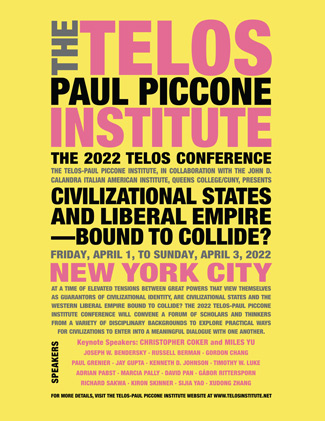In today’s episode of the Telos Press Podcast, David Pan talks with Mark G.E. Kelly and Timothy W. Luke about the Russian invasion of Ukraine and its consequences for world order. Our current issue, Telos 199 (Summer 2022), features essays by Luke, Kelly, and Pan on the war in Ukraine, excerpts of which appear here. Click through to read the full articles at the Telos Online website (subscription required). To learn how your university can subscribe to Telos, visit our library recommendation page. Print copies of Telos 199 are also available for purchase in our online store.
|
In today’s episode of the Telos Press Podcast, David Pan talks with Courtney Hodrick about her article “From Neoreaction to Alt-Right: A Schmittian Perspective,” from Telos 198 (Spring 2022). An excerpt of the article appears here. In their conversation they discuss Carl Schmitt’s understanding of the relationship between liberalism and democracy, and how the separation of the two from each other leads to two versions of extreme right thinking; the general outlines of Mencius Moldbug’s rejection of politics in favor of markets and the relationship between this approach and Schmitt’s understanding of politics as based in the friend/enemy distinction; why Moldbug is an example of what Schmitt defines as liberal; how Moldbug’s ideas contrast with those of Richard Spencer and the extent to which Spencer is a Schmittian; and Curtis Yarvin’s recent shift away from his previous rejections of nationalism and whether this shift represents a merging of neoreaction with alt-right populism. If your university has an online subscription to Telos, you can read the full article at the Telos Online website. For non-subscribers, learn how your university can begin a subscription to Telos at our library recommendation page. Print copies of Telos 198 are available for purchase in our online store. In today’s episode of the Telos Press Podcast, David Pan talks with Georges Van Den Abbeele about his article “Can the Precariat Be Organized?: The Gig Economy, Worksite Dispersion, and the Challenge of Mutual Aid,” from Telos 198 (Spring 2022). An excerpt of the article appears here. In their conversation they discuss the history of the welfare state in the context of mutual aid, the idea of the “precariat” and how it relates to the idea of the working class and the question of mutual aid, and the new forms of mutual aid that are now possible with the rise of both the gig economy and new forms of social interaction. If your university has an online subscription to Telos, you can read the full article at the Telos Online website. For non-subscribers, learn how your university can begin a subscription to Telos at our library recommendation page. Print copies of Telos 198 are available for purchase in our online store. In today’s episode of the Telos Press Podcast, David Pan talks with Martin Tomszak about his article “‘With Desire I Have Desired’: Enjoying the Face of the Other as Political Theology: John Caputo and Dorothy Day Situating Hospitality as Divine Encounter,” from Telos 198 (Spring 2022). An excerpt of the article appears here. In their conversation they discuss the basic tenets of the theology of divine weakness, as developed by John Caputo; how this theology arises out of Caputo’s reading of Derrida and his rereading of scripture, specially Luke’s description of the life of Jesus of Nazareth; how Dorothy Day and the Catholic Worker movement translated this theology of divine weakness into practice; how this theology relates to the writings and praxis of Peter Maurin; and how Day and Maurin understood the idea of state sovereignty and why they were opposed to state-sponsored forms of welfare. If your university has an online subscription to Telos, you can read the full article at the Telos Online website. For non-subscribers, learn how your university can begin a subscription to Telos at our library recommendation page. Print copies of Telos 198 are available for purchase in our online store. On the latest episode of the Outsider Theory podcast, host Geoff Shullenberger talks with Jacob Siegel, senior writer at Tablet and co-host of Manifesto! A Podcast, about the rightward trajectory of certain insights of Frankfurt School–derived critical theory, especially in light of the history of the Telos and its founder and editor, Paul Piccone. The discussion also turns to Piccone’s friend Paul Gottfried, the continued relevance of Herbert Marcuse’s “Repressive Tolerance,” the Thiel-affiliated New Right’s cultivation of a counter-elite, the recent Vanity Fair profile of the Thielverse, and more. Listen to the podcast here. For a limited time, save 20% on individual subscriptions to Telos and on Telos Press books by using the coupon code OUTSIDER20 in our online store. Writing at the National Interest, Alex Hu reports on the recent 2022 Telos Conference, entitled “Civilizational States and Liberal Empire—Bound to Collide?” An excerpt from the article:
|
||||
|
Telos Press Publishing · PO Box 811 · Candor, NY 13743 · Phone: 212-228-6479 Privacy Policy · Data Protection Copyright © 2025 Telos Press Publishing · All Rights Reserved |
||||



